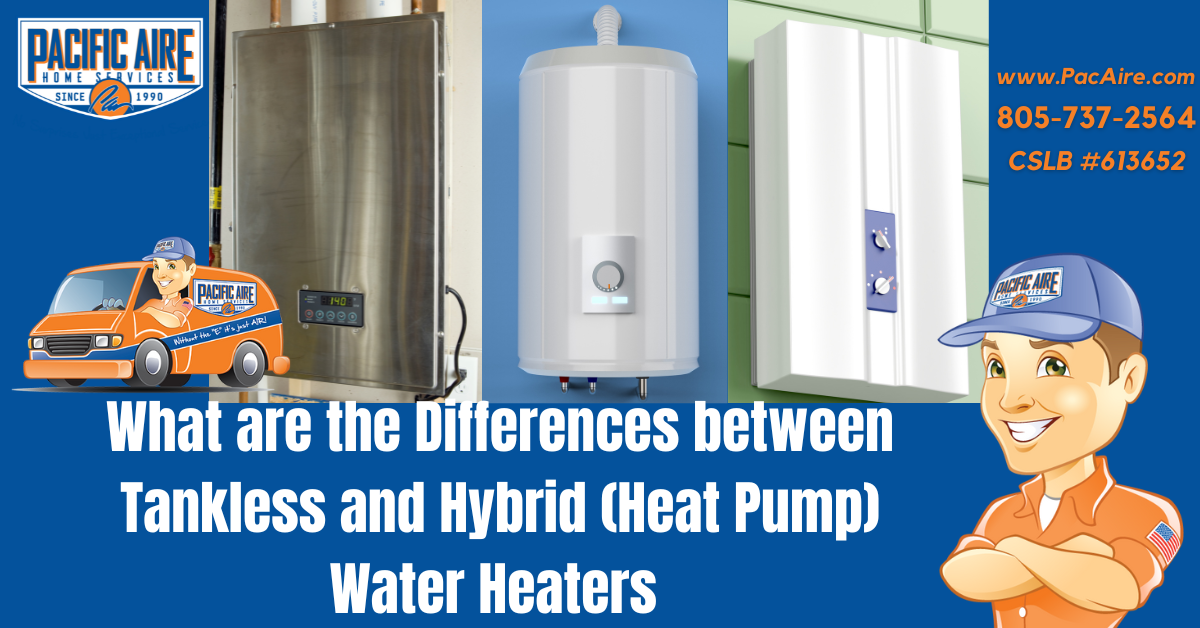If you’re considering an upgrade to your water heater, understanding the differences between tankless and hybrid (heat pump) water heaters can significantly impact your choice. Both options have their unique advantages and disadvantages that cater to various household needs. Here’s a concise breakdown of their key differences :
Understanding Tankless Water Heaters
Tankless water heaters, also known as on-demand water heaters, are a modern alternative to traditional tank-based systems. They function by heating water only when needed, eliminating the standby heat loss common in traditional tanks. This results in increased energy efficiency and a more environmentally friendly operation.
Advantages of Tankless Water Heaters:
- Energy Efficiency: Tankless systems provide hot water on demand, minimizing energy consumption compared to continuously heating water in a storage tank.
- Longevity: With proper maintenance, tankless systems often outlast traditional tank heaters.
- Space-Saving: They are smaller and can be installed in tight spaces, freeing up room in your utility area.
- Continuous Hot Water Supply: As they heat water on demand, you’ll have a constant supply of hot water without the risk of running out.
The Disadvantages of Tankless Water Heaters:
- Higher Initial Cost: The upfront expense for a tankless water heater, including installation, tends to be higher than traditional tank water heaters.
- Output Limitations: Tankless systems may struggle to meet high hot water demand in larger households simultaneously.
- Installation Requirements: Upgrades to gas lines or electrical systems might be necessary, contributing to installation costs.
- Potential Temperature Fluctuations: Users might experience brief fluctuations in water temperature during use, known as the “cold water sandwich effect.”
Exploring (Hybrid) Heat Pump Water Heaters
Hybrid water heaters, a form of heat pump water heaters, merge heat pump and electric resistance technology to heat water. They are recognized for their exceptional energy efficiency, environmental friendliness, and consistent hot water supply.
According to assessments by the U.S. Department of Energy and ENERGY STAR, a heat pump water heater can offer efficiency levels up to three times higher than those of conventional electric water heaters and up to 50% greater efficiency compared to natural gas water heaters.
Advantages of Hybrid Water Heaters:
- Remarkable Energy Efficiency: These systems significantly reduce energy consumption compared to conventional methods, contributing to lower utility bills.
- Environmental Benefits: With a lower carbon footprint, they aid in reducing environmental impact.
- Consistent and Reliable Performance: Hybrid systems offer a more reliable and comfortable hot water supply compared to tankless systems.
- Financial Incentives: Various tax credits and rebates are available due to their energy-saving features.
Disadvantages of Hybrid Water Heaters:
- Higher Initial Cost: Hybrid water heaters typically have a higher upfront expense compared to tankless systems.
- Possible Electrical Upgrades: Homes might require electrical panel upgrades to accommodate these systems, adding to installation costs.
- Lifespan Concerns: There might be concerns regarding the lifespan compared to tankless systems.
- Performance in Cold Climates: Hybrid systems might operate less efficiently in colder climates, affecting their overall efficiency.
Comparative Analysis of Tankless and Hybrid Water Heaters
Comparing these two types of water heaters, several factors can influence your decision-making process:
- Efficiency: Hybrid water heaters stand out for their superior energy efficiency compared to tankless models.
- Cost: Both options entail a higher initial cost, but hybrid systems are typically more expensive.
- Space and Installation: Tankless systems are more compact, but both might require additional installation needs.
- Durability: Tankless systems may boast a longer lifespan compared to hybrid units.
- Performance: Hybrid systems provide a more consistent supply of hot water, especially in colder climates, while tankless systems might struggle with larger simultaneous demands.
Conclusion
While both tankless and hybrid water heaters offer unique advantages, the choice you make should be tailored to your household’s specific requirements, including hot water usage patterns, location, and budget. Consulting with a professional can guide you in determining the best fit for your unique circumstances. Whether prioritizing energy efficiency or on-demand hot water supply, upgrading to either system will enhance your home’s efficiency, comfort, and contribute to reduced energy costs and environmental impact.
Visit https://bit.ly/pacaire-plumbing-water-heater to learn more about our plumbing services, or call us at 805-737-2564 for all of your HVAC needs.


